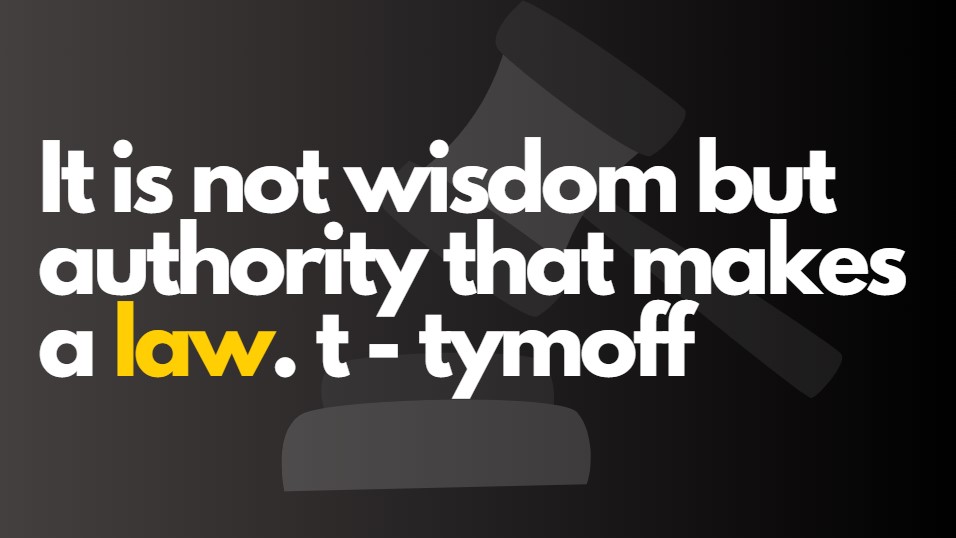Introduction
The age-old debate surrounding the origin and purpose of law has intrigued philosophers, scholars, and legal minds throughout history. While many have contended that laws should be rooted in wisdom and reason, others argue that authority alone is sufficient to shape the legal landscape. The quote by T.
Tymoff, “It is not wisdom but authority that makes a law,” is a provocative assertion that challenges traditional notions of lawmaking. In this article, we will delve into the meaning behind this statement, explore its implications, and discuss the ongoing debate surrounding the sources of law and its fundamental role in society.

The Nature of Law
Before delving into the assertion that authority, rather than wisdom, makes a law, it is essential to understand the nature and purpose of law itself. Law is a system of rules and principles created and enforced by a governing authority to regulate human behavior in a society. It serves various purposes, including maintaining order, protecting individual rights, promoting justice, and facilitating social and economic development.
must read= Paul MacKoul, MD Lawsuit
The question of whether wisdom or authority should be the primary driver behind lawmaking revolves around how these goals are best achieved.

Wisdom as the Foundation of Law
The idea that wisdom should be the cornerstone of lawmaking has deep historical roots. Many great philosophers, including Aristotle and John Locke, argued that laws should be guided by reason, moral principles, and the greater good of society. This perspective posits that laws born out of wisdom and ethical considerations are more likely to be just, fair, and conducive to societal progress.
Proponents of this viewpoint assert that laws derived from wisdom tend to reflect the values and aspirations of a community. They argue that laws informed by rational thought and moral principles are more likely to address societal issues effectively, adapt to changing circumstances, and stand the test of time. Wisdom-based lawmaking encourages deliberation, debate, and consensus-building, leading to a more inclusive and just legal framework.
Authority as the Source of Law
Contrastingly, the assertion that authority is the primary driver behind lawmaking implies that laws are created and enforced by those in power, irrespective of their wisdom or the wisdom of the laws themselves. This perspective is often associated with authoritarian or totalitarian regimes where laws are imposed from the top down, without substantial input from the populace.

While this approach may raise concerns about the potential for injustice and the abuse of power, proponents of authority-based lawmaking argue that it can provide swift and decisive responses to pressing issues. This can be particularly relevant in situations where societal stability and order are paramount, such as during times of crisis or transition.
Implications of the Authority-Based Perspective
When authority is the dominant force in lawmaking, it raises several concerns. First, there is the risk of laws being arbitrary and devoid of moral or ethical considerations. Laws created solely for the benefit of the ruling authority may not serve the best interests of the general population, resulting in societal unrest and injustice.
Furthermore, the authority-based perspective can stifle dissent and hinder the development of a just and inclusive legal system. It can create an environment in which people are afraid to question or challenge the established laws, leading to a lack of innovation and social progress. Additionally, this approach often leads to a concentration of power within the ruling elite, reinforcing social hierarchies and limiting the participation of marginalized groups in the lawmaking process.
The Role of Wisdom and Authority in Modern Legal Systems
In contemporary legal systems, a delicate balance between wisdom and authority is often sought. Most democratic societies aim to incorporate both elements, recognizing that an exclusive focus on either wisdom or authority can lead to problems.
In democratic systems, wisdom is represented by a legislative branch, where elected representatives are expected to make laws based on their understanding of the public’s needs and values. This democratic wisdom allows for laws that reflect the diverse perspectives of the population.
However, authority still plays a crucial role in implementing and enforcing these laws. Law enforcement agencies, the judiciary, and executive branches ensure that laws are adhered to and enforced consistently. The authority-based perspective can lead to the proper functioning of a legal system, as long as the authority operates within the framework of the law and respects the principles of justice and human rights.
Challenges and Considerations
The debate between wisdom and authority as the foundation of law is not easily resolved. There are situations where each perspective may be more appropriate, and the context matters significantly. In times of crisis, such as a pandemic or natural disaster, a swift and authoritative response may be necessary to maintain order and protect public health. However, in matters of social justice and the protection of individual rights, wisdom-based lawmaking is crucial.
Moreover, there is often an interplay between wisdom and authority in the evolution of legal systems. Wisdom-based lawmaking, informed by ethical principles, can influence the development of legal norms, which are then enforced through authority. As societies progress, the emphasis on wisdom may grow, leading to the reform of outdated laws and the creation of new ones in line with changing values and societal needs.
Conclusion
T. Tymoff’s assertion, “It is not wisdom but authority that makes a law,” invites us to ponder the complex relationship between these two elements in the realm of lawmaking. While wisdom-based lawmaking emphasizes reason, ethics, and the greater good, authority-based lawmaking underscores the role of power and the need for immediate, authoritative responses to certain situations.
In modern democratic societies, a balance between wisdom and authority is often sought to ensure that laws are just, equitable, and reflective of the values of the populace. Striking the right balance between these two forces is an ongoing challenge, as the dynamics of each situation, cultural shifts, and societal changes require a flexible and thoughtful approach to lawmaking. In the end, the effectiveness of legal systems lies in their ability to harmonize wisdom and authority to serve the best interests of society and its individuals.
